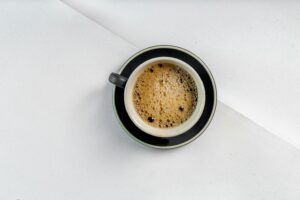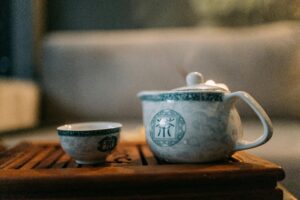Coffee is one of the most widely consumed beverages in the world, beloved for its rich flavor and energizing effects. For millions of people, that morning cup of coffee is more than just a drink—it’s a ritual. Yet, alongside its benefits, coffee has also developed a reputation for worsening anxiety in some individuals. While some people swear by coffee for boosting focus and productivity, others avoid it because it makes them jittery, restless, or even panicky.
Table of Contents
So, what’s the real connection between coffee and anxiety? Is caffeine truly harmful to mental health, or is it simply a matter of moderation and individual sensitivity? In this comprehensive guide, we’ll uncover the science behind caffeine’s effects on the brain and body, examine what experts say about coffee and anxiety, and explore practical strategies for enjoying coffee without triggering unwanted side effects.
Understanding Caffeine and Its Effects
Caffeine is a natural stimulant found in coffee beans, tea leaves, cacao, and certain energy drinks. When consumed, caffeine blocks adenosine, a neurotransmitter that makes us feel sleepy. At the same time, it increases dopamine and norepinephrine activity, which enhances alertness, focus, and mood.
For many, this is a welcome effect. However, the same stimulation can also mimic or intensify the physiological symptoms of anxiety. Increased heart rate, sweating, restlessness, and racing thoughts—these are common side effects of high caffeine intake, and they overlap with typical anxiety symptoms.
Why Coffee Can Trigger Anxiety
1. Heightened Stress Response
Caffeine stimulates the release of cortisol and adrenaline, the body’s stress hormones. This “fight or flight” response is useful for boosting performance in short bursts, but for people prone to anxiety, it can amplify feelings of unease and nervousness.
2. Increased Heart Rate and Jitters
A rapid heartbeat, shaking hands, and restlessness are hallmark side effects of too much caffeine. For individuals with panic disorder or generalized anxiety disorder, these physical sensations can act as triggers, leading to heightened worry or even panic attacks.
3. Sleep Disruption
Caffeine has a half-life of about 5–6 hours, meaning it can stay active in your system well into the evening. Poor sleep quality or insomnia is strongly linked to increased anxiety, creating a cycle where caffeine worsens rest, and lack of rest worsens anxiety.
4. Individual Sensitivity
Not everyone processes caffeine the same way. Genetics play a role in how quickly caffeine is metabolized. Those who metabolize it slowly are more likely to experience heightened anxiety, insomnia, and jitteriness even with smaller doses.
How Much Coffee Is Too Much?
According to health experts, most adults can safely consume up to 400 mg of caffeine per day (about 3–4 standard cups of brewed coffee). However, the threshold for triggering anxiety varies widely. Some may feel fine with two strong espressos, while others might feel anxious after a single cup of drip coffee.
Paying attention to your body’s response is essential. If coffee tends to make you restless, irritable, or tense, it may be time to reconsider your caffeine habits.
Expert Insights: Coffee and Anxiety
Psychologists, nutritionists, and medical researchers have studied caffeine’s role in anxiety extensively. Here’s what the experts say:
- Dr. Roland Griffiths, Johns Hopkins University – Notes that caffeine can exacerbate pre-existing anxiety conditions by increasing physiological arousal.
- National Institute of Mental Health – Lists caffeine reduction as a common lifestyle recommendation for managing anxiety symptoms.
- Harvard Medical School – Suggests that moderate caffeine intake may actually benefit mood and cognitive performance, but excessive intake raises the risk of anxiety and panic symptoms.
In short, experts agree: coffee itself isn’t inherently harmful, but high consumption or sensitivity can significantly affect anxiety levels.
Balancing Coffee and Mental Health
If you love coffee but worry about its effect on anxiety, the good news is you don’t necessarily have to give it up. Instead, you can find a middle ground. Here are strategies to enjoy coffee responsibly:
1. Monitor Your Intake
Keep track of how much caffeine you consume daily. Remember that coffee isn’t the only source—tea, chocolate, sodas, and energy drinks contribute too.
2. Switch to Lower-Caffeine Options
Try half-caf blends, decaf coffee, or green tea. These allow you to enjoy the ritual of drinking coffee without as much stimulation.
3. Time Your Coffee Wisely
Avoid drinking coffee in the late afternoon or evening, as it can interfere with sleep. Morning consumption is best for minimizing long-term effects on rest and anxiety.
4. Don’t Drink on an Empty Stomach
Coffee on an empty stomach can cause spikes in cortisol and blood sugar, making jitters worse. Pair your coffee with a balanced breakfast to reduce its impact.
5. Practice Mindful Coffee Drinking
Instead of rushing through your coffee, slow down. Savor the aroma, flavor, and warmth. Turning coffee into a mindful ritual can reduce anxiety rather than fuel it.
Alternatives to Coffee for the Anxious Mind
If coffee simply doesn’t work for you, there are plenty of alternatives that provide a gentle energy boost without the same anxious side effects:
- Matcha Green Tea – Contains caffeine but also L-theanine, an amino acid that promotes calm focus.
- Herbal Teas (like chamomile or peppermint) – Caffeine-free and soothing.
- Golden Milk (turmeric latte) – Anti-inflammatory and calming, with no caffeine.
- Mushroom Coffee – Uses adaptogenic mushrooms like reishi or lion’s mane, often with less caffeine.
- Chicory Root Coffee – A caffeine-free alternative that mimics coffee’s flavor.
When to Consider Cutting Back on Coffee
You may want to reduce or eliminate coffee if you experience:
- Frequent panic attacks or worsening anxiety after drinking coffee.
- Difficulty sleeping, even when drinking coffee early in the day.
- Reliance on coffee to get through normal daily tasks.
- Physical side effects like shaking, palpitations, or stomach upset.
Reducing intake gradually is best, as stopping abruptly can cause withdrawal symptoms like headaches, irritability, and fatigue.
Final Thoughts
Coffee is both a beloved daily ritual and a potential trigger for anxiety. Its effects depend largely on your individual sensitivity, consumption habits, and overall mental health. While moderate coffee drinking is safe—and even beneficial—for many, those who struggle with anxiety may need to approach it with more caution.
The truth about coffee and anxiety is not black and white. For some, coffee enhances focus and mood. For others, it fuels nervous energy and worsens stress. The key is listening to your body, finding your personal caffeine threshold, and making mindful choices that support your mental well-being.
If coffee feels like it worsens your anxiety, you don’t have to give it up completely—but you may need to change how, when, and how much you drink it. And if giving it up entirely makes you feel better, that’s perfectly valid too. After all, your health and peace of mind matter more than any cup of coffee.










